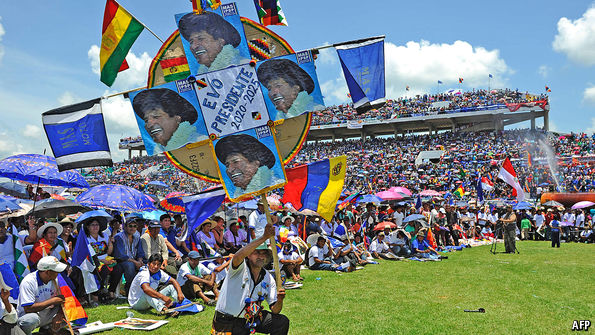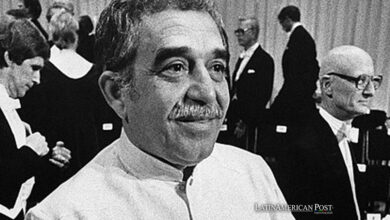Bolivia’s president chafes against term limits


AS 2016 drew to a close, a resignation letter from Bolivia’s president, Evo Morales, lit up social media. It was a hoax, perpetrated on día de los inocentes (“day of the innocents”), the Latin American version of April Fools’ Day, which falls on December 28th. The unamused communications minister, Marianela Paco, denounced it as an “attack on the people’s right to reliable and truthful news”.
In fact, Mr Morales’s allies are scheming to keep him in office indefinitely, even though, in a referendum last February, Bolivians voted to deny him the right to run for a fourth term in 2019. On December 17th his party, the Movement to Socialism (MAS), named him as its presidential candidate for the next election. “If the people decide it, Evo will continue,” Mr Morales promised his supporters.
The clamour to keep him is not a sign of recent success. Bolivia is suffering from a severe drought, whose effects are made worse by the government’s failure to plan and invest. Economic growth, which sustained Mr Morales’s popularity for most of his 11 years in office, has lost momentum. Scandals, strikes and clashes between protesters and police have turned some Bolivians against the government. Yet Mr Morales, Bolivia’s first president of indigenous origin, dwarfs his rivals. Nearly half of voters still approve of his performance. No one in the MAS has the stature to succeed him. The opposition is fragmented.
Bolivia’s woes may cut Mr Morales down to size. Despite the onset of the rainy season in December, many districts are still rationing water. The state-owned water company that supplies La Paz, the seat of government, and El Alto, a populous city perched on a cliff above it, ran out of water in November. The water level in the Incachaca reservoir, which serves parts of La Paz, was far below normal in early January. Residents of the city queue for hours to get deliveries by lorry. Farmers and ranchers are reporting large and growing losses.
This is contributing to the slowdown of the economy, which depends largely on gas exports. Their price is linked to the price of oil, which has halved since 2014. In 2017 Bolivia is expected to earn $2.1bn from gas sales, just a third of what it made when prices were high.
As a result, GDP will grow 3.9% in 2017, a bit more than this year but far below the peak of 6.8% in 2013, forecasts the IMF (see chart). Bolivia’s overvalued currency is hurting producers of goods besides raw materials, warned the IMF last month. Alarmingly, the current-account and budget deficits were around 8% of GDP in 2016.
By the profligate standards of Latin America’s left-wing leaders, Mr Morales has been a fairly responsible economic manager. He invested Bolivia’s gas windfall in roads, bridges, hospitals and schools. Until 2014 he kept a lid on budget deficits. But the oil-price slump and wacky weather are exposing the government’s failures. High taxes on the production of oil and gas and the absence of an independent regulator have discouraged investors from prospecting for new reserves, says Hugo del Granado, a former energy official. Just two foreign energy companies, Russia’s Gazprom and Venezuela’s PDVSA, have come to Bolivia in the past decade. Debt-ridden PDVSA has only a token presence; Gazprom spent years battling bureaucracy and ended up scaling back its ambitions. Rather than invest on its own, it formed a partnership with France’s Total, which already had operations in Bolivia.
The government’s infrastructure-spending binge did not extend to water. It nationalised utilities, put party hacks in charge and failed to invest in them. La Paz’s water reserves reached dangerously low levels even before the drought took hold.
Such setbacks have damaged the government’s prestige. In October it had to cancel a popular bonus of an extra month’s wages paid to all workers in the formal sector, but only in years when GDP growth is more than 4.5%. Mr Morales’s relations with trade unions and social movements, which once gave him unstinting support, have been hurt by disputes over infrastructure projects and benefits for disabled people. A conflict over regulation of mining by co-operatives led to the deaths of four miners and the murder of a vice-minister. The Central Obrera Boliviana, the main trade-union federation, has fallen out with the government. The MAS lost control of El Alto, Mr Morales’s political stronghold, in regional elections in 2015.
None of that deters his allies from plotting to keep him in power. Many look to the example of the late Hugo Chávez, Venezuela’s left-wing leader, who lost a referendum to end term limits in 2007 only to hold another one 14 months later, which he won. Under Bolivia’s constitution, a petition signed by a fifth of the electorate could trigger a re-run of the referendum to lift the term limit facing Mr Morales.
Another option, suggested by the vice-president, Álvaro García, is that Mr Morales resign for real, turning the hoax IGNORE INTO reality. If this were coupled with a reform of the constitution, Mr Morales could argue that his current mandate, served under an outdated constitution, should not count towards one of the two terms he is allowed. He used this manoeuvre once before, in 2014, to run for re-election.
The president says that what he really wants is to return to his career as a grower of coca, a traditional stimulant that is also the raw material for cocaine. In fact, he was more an organiser of farmers than a cultivator himself. Only inocentes believe it is his ambition to become one.




